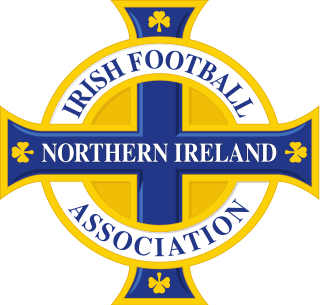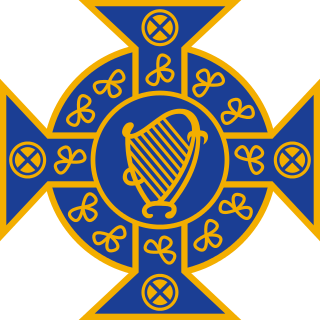
The Northern Ireland men's national football team represents Northern Ireland in international association football. From 1882 to 1950, all of Ireland was represented by a single side, the Ireland national football team, organised by the Irish Football Association (IFA). In 1921, the jurisdiction of the IFA was reduced to Northern Ireland following the secession of clubs in the soon-to-be Irish Free State, although its team remained the national team for all of Ireland until 1950, and used the name Ireland until the 1970s. The Football Association of Ireland (FAI) organises the separate Republic of Ireland national football team.
The Irish Football Association (IFA) is the governing body for association football in Northern Ireland. It organised the Ireland national football team from 1880 to 1950, which after 1954, became the Northern Ireland national football team.

The United Kingdom national football team are a football team that represents the United Kingdom. Despite football being the most popular sport in the country, the team has not played since 1965 as separate teams represent each home nation in all major international football tournaments such as the FIFA World Cup and UEFA European Championship, as well as various friendlies. It is the home nations which are FIFA affiliated and not the United Kingdom as a whole.
Association football in Northern Ireland, widely known as football or sometimes as soccer, is one of the most popular sports in Northern Ireland. The governing body in Northern Ireland is the Irish Football Association (IFA). Gaelic football, rugby union and association football are the most popular sports in Northern Ireland.

William Lacey was an Irish footballer who played for, among others, Shelbourne, Liverpool, Everton and Linfield. Lacey was a dual international and also played for both Ireland teams – the IFA XI and the FAI XI.
Thomas Aherne, also referred to as Bud Aherne, was an Irish footballer and hurler. He played football for Belfast Celtic and Luton Town and was a dual internationalist, playing for both Ireland teams – the IFA XI and the FAI XI. In 1949 he was a member of the FAI XI that defeated England 2–0 at Goodison Park, becoming the first non-UK team to beat England at home. As a hurler he also played one game for Limerick.

The Ireland national football team represented the island of Ireland in association football from 1882 until 1950. It was organised by the Irish Football Association (IFA), and is the fourth oldest international team in the world. It mainly played in the British Home Championship against England, Scotland and Wales. Though often vying with Wales to avoid the wooden spoon, Ireland won the Championship in 1914, and shared it with England and Scotland in 1903.

Association football commonly referred to as football or soccer, is the team sport with the second highest level of participation in the Republic of Ireland.

Cornelius Joseph Martin was an Irish footballer. Martin initially played Gaelic football for the Dublin county team before switching codes and embarking on a successful soccer career, playing for, among others, Drumcondra, Glentoran, Leeds United and Aston Villa.
1949–50 British Home Championship was one of the most significant competitions of the British Home Championship football tournament. This year saw the competition doubling up as Group 1 in the qualifying rounds for the 1950 FIFA World Cup. It was the first time that either England, Wales, Scotland or Ireland (IFA) had entered a World Cup competition. It was also a significant moment in the history of Irish football as it was the last time that the (Northern) Irish Football Association entered a team featuring players born in both Northern Ireland and what is now the Republic of Ireland.

David Joseph Walsh, commonly referred to as Davy Walsh or Dave Walsh, was an Irish footballer who played as a centre forward for, among others, Linfield, West Bromwich Albion and Aston Villa. Walsh was a dual international and played for both Ireland teams – the FAI XI and the IFA XI. In 1949, he was a member of the FAI XI that defeated England 2–0 at Goodison Park, becoming the first team to beat England at home.

The Football Association of Ireland is the governing body for association football in the Republic of Ireland.

This is a list of the Ireland national football team results from 1882 to 1899. From 1882 to 1921 all of Ireland was represented by a single side, the Ireland national football team, organised by the Irish Football Association (IFA).
The Leinster Football Association (LFA) is the governing body for association football in the Irish province of Leinster. It is responsible for organizing the Leinster Senior Cup and the Leinster Senior League as well as numerous other leagues and cup competitions for junior and youth teams. It was founded in 1892 and is the oldest football association in what is now the Republic of Ireland. Outside of the United Kingdom, only the national football associations of Denmark and the Netherlands are older. It was originally affiliated to the Belfast–based Irish Football Association, but following the partition of Ireland in 1921, it seceded from the IFA and subsequently played a leading role in the establishment of the Dublin–based Football Association of Ireland. It remains closely associated with the FAI and even shares a headquarters.
In association football, the FIFA eligibility rules are the eligibility criteria established by FIFA, the sport's governing body, to facilitate the selection of representative teams for international competitions. Specifically, FIFA maintains and implements rules determining a player's eligibility to represent a particular national team in officially sanctioned international competitions and friendly matches.

An all-Ireland football team has been proposed on several occasions as a national representative association football team for the whole island of Ireland, an island which is politically divided into Northern Ireland and the Republic of Ireland and which currently has two separate teams.

The Northern Ireland national football team represents Northern Ireland in international association football. From 1882 to 1921 all of Ireland was represented by a single side, the Ireland national football team, organised by the Irish Football Association (IFA).

The Northern Ireland national football team represents Northern Ireland in international association football. From 1882 to 1921 all of Ireland was represented by a single side, the Ireland national football team, organised by the Irish Football Association (IFA).

The Northern Ireland national football team represents Northern Ireland in international association football. From 1882 to 1921 all of Ireland was represented by a single side, the Ireland national football team, organised by the Irish Football Association (IFA).










